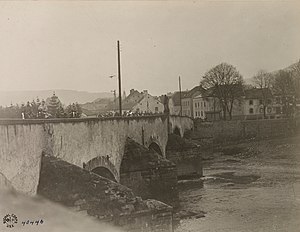
In the middle of a little village on the German/Luxembourg border, our camper van’s exhaust pipe drops off (that’s our motorhome’s muffler to you, my American friends) and I gain another chance to prove to my daughter the value of speaking a foreign language.
It’s a blue-skied, sunny public holiday – Easter Monday – so I’m particular conscious that we’re disturbing the peace in this beautiful setting.
The locals are very forgiving. We chug noisily up a hilly street, emitting a sound so deafening that my husband and I have to shout to each other to converse. A large group of jovial chaps basking in the sunshine in their front garden raise their glasses to us, with a loud cheer. We smile and wave, heartened by their kindly reaction.
On reaching our planned destination for the night, the border town of Echternach – yet another Luxemburgish town separated from Germany by only a river – we call the English-speaking helpline of the European recovery service to which we belong. Soon, a tow truck from the town’s garage comes to our rescue, and a brace of mechanics disembarks.
In preparation, I’ve found a relevant double-page spread in our French pocket phrase book. It includes a diagram of a car, its important parts labelled in French. Actually, even in English translation it’s foreign territory to me. I don’t know my chassis from my carburettor. I’ve rehearsed in my head the conversation we will need to have, beginning “Nous sommes en panne”, which is rather stating the obvious.
At the Mercy of Mechanics

The stout grey-haired man, clearly the senior of our dynamic duo, crawls underneath the van to inspect the damage that the rescue service described to him. After a few moments of shifting around on the car park’s gravel floor (ouch!), he emerges happy. Dusting himself down, he rattles off his diagnosis in Letzerburgesch to his blond companion. I have absolutely no idea what he’s said. We – and our bank account – are at his mercy.
The blond chap nods and turns to us to negotiate. To our intense relief, he speaks to us in flawless, fluent American English.
“Don’t worry, we will make it safe for you to get home,” he says cheerfully.
“We’ve felt bad making such a noise going through your little villages on a public holiday,” I confess.
He shrugs and smiles.
“People need to worry less about things like that.”
It turns out they can solve our problem quickly and easily. They assure us that the van is safe to drive and that their garage is not far away. We are to follow them and not to worry.
Lured into their Lair
The garage is indeed just a few streets distant, tucked unobtrusively between a row of houses. If it didn’t have a sign on the outside announcing its purpose, we’d have thought it was just another residential building. Its large workshop is as cunningly concealed as a Bond villain’s lair inside a volcano.
Entering, we discover the place is so immaculate that you could eat your breakfast croissant off the floor. The distinctive smell of engine oil, characteristic of most garages, is strangely absent. How do they do it? I look round expecting to find a jumbo-sized Airwick, to no avail.
My husband is more concerned about the practicalities of the place than the aesthetics.
“Are you a Peugeot dealer?” he is asking. “Do you have a replacement part in stock?”
“We used to be, but not any more. Now we just do repairs.”
I immediately feel sorry for these pleasant people. What a shame to lose their dealership status. I hope they’re still able to make a decent living – and that our bill will not be inflated to compensate for lost business.
We’re invited to retreat to the immaculate waiting area, where we sit on smart leather seats beside a vast pile of upmarket glossy magazines. Opposite us, in a spacious and shining glass booth, a smartly dressed lady busily works on the accounts.
All of this scenario is the polar opposite of the garage we use at home, where the stench of oil saturates the air, and the waiting area is as cramped as it’s possible to be without qualifying for the Guinness Book of Records. Its flawless service and honest staff are what keep us loyal.
Back in Luxembourg, the pink-cheeked blond mechanic, clean as a newly-bathed baby, settles down contentedly on the other side of a counter that overlooks both the workshop and the waiting area. He has the leisure, it seems, for a chat about our travels. My husband remarks that the Mosel Valley, where we’ve just come from, was largely a camper van car park. (He’s exaggerating, as usual, but not by much.) Our spotless friend smiles.
“That’s how they make 90% of their money, from tourism,” he opines, with no trace of a grudge. “Only 10% from wine.”
As he speaks, my eye is caught by flashing lights in the service area underneath our van. Someone is wielding a welding iron.
Keeping Good Company

It is then that I spot the only other vehicle in the garage: a vast, ancient black Rolls Royce, bonnet (hood) raised and engine stripped back as if modelling for the diagram in my phrase book. It is stunningly beautiful. My jaw drops.
The blond one follows my gaze and smiles proudly.
“We are rebuilding it, piece by piece, for a customer,” he explains. “There are only eight of that model left in the world. It is worth 500,000 Euros.”
That’s approximately 50 times the value of our camper van.
“Does it belong to a museum?” I venture.
He shakes his head.
“Private owner.”
“There’s a lot of money in Luxembourg,” I murmur.
“I am from the Netherlands,” he replies, hinting that he was lured here by the money.
Immediately and unselfconsciously, he demonstrates his countrymen’s famous facility for languages by addressing the welder, now standing in the doorway, in rapid Letzerburgesch.
“All done!” he translates for us, looking pleased. “We have welded a sleeve around the muffler. Not only will it get you safely home, it will last a long time. No need to replace it when you get there.”
My husband produces his wallet, looking nervous.
“How much?”
The blond one consults his colleague in Letzerburgesch.
“Do you need a receipt?” he breaks off to ask us in English.
“No.”
“In that case, 40 Euros.”
My husband goes to pull out a credit card but I detect a flinch on the part of our blue-eyed friend.
“For cash?” I offer, suppressing a knowing grin.
“Yes, please!”
Aha, so there is a common factor with our scruffy English garages after all.
We drive on our way, oh so quietly, thanking fate for bringing us to a Luxemburger garage where our modest needs may be subsidised by a local millionaire.

For other reasons why we learned to love Luxembourg, read these recent posts:
